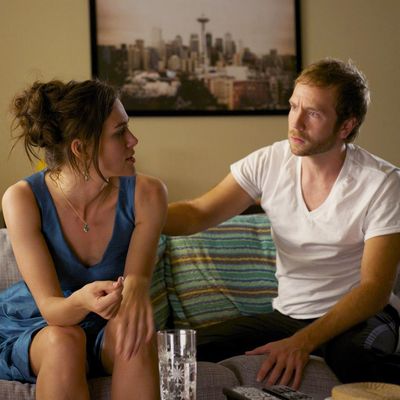
In Lynn Shelton’s Laggies, Keira Knightley plays a twentysomething woman who, still unable to deal with the onset of life’s responsibilities, starts hanging out with a group of high-schoolers; this seems like an ideal role for Keira Knightley, who appears to be forever hovering on the edge of adulthood herself, her alabaster features a strange mix of fresh-faced wonder and regal reserve. Other characters point out a couple of times that she seems too old to be consorting with teenagers, but in reality, the 29-year-old Knightley doesn’t seem so far removed from them. She could probably still play a teenager if she put her mind to it. (Just three years ago, she was Sabina Spielrein in A Dangerous Method, who, according to the historical record, was 19 when the events of that film began.)
The reason I’m focusing on the youthfulness of Knightley’s appearance is because it makes a world of difference to the tone of Laggies. With an older-looking actor in the role, the film may have felt like a surreal portrait of neurosis. But here, it’s actually something of a lighthearted, at times, even romantic, comedy. The disconnect between Megan (Knightley) and her newfound friends plays as more adorably offbeat than just plain weird.
Still, Shelton and screenwriter Andrea Seigel convincingly give us a woman who, in the film’s early scenes, is eerily incapable of moving on with her life. Megan’s one job is holding up a sign advertising her dad’s accounting services. She and her longtime boyfriend Anthony (Mark Webber) have been hovering around marriage forever but he’s never popped the question; in truth, she kind of didn’t want him to, as she discovers one night when he actually does pop the question at her best friend’s wedding. This is the same wedding where she starts to realize that she’s increasingly out of step with her more driven friends. It’s also the same wedding where she discovers her dad (Jeff Garlin) in the midst of a torrid make-out session with a woman who is not her mother.
Fleeing this world of incipient responsibility and looming marital horror, Megan runs into a group of kids outside a convenience store. One of them, Annika (Chloe Grace Moretz), politely asks her to buy them some alcohol. Megan does so, and one nostalgic skateboard trick later, she’s rolling with the kids and besties with Annika, accepted as a vaguely cool adult. The story turns on a dime here, but we buy it: She belongs more to their tribe than she does to hers. Megan tells Anthony that she’s going on a retreat to take a personal-development seminar, and she starts crashing at Annika’s house — much to the bemusement of the young girl’s single, charming, endlessly patient, and good-humored dad (Sam Rockwell, getting all the good lines as usual).
We basically know where Laggies is headed; the film is a soft, straight, easy pitch down the middle, story-wise. And it’s a light movie: You won’t get a particularly profound look at adults who act like kids from it. The screenplay resolves character conflicts with unnerving speed. But this is also a uniquely inviting film, shot through with the humanity with which Shelton (who directed the glorious Humpday and Your Sister’s Sister) usually treats her characters. Annika and her friends aren’t the brash, mouthy kids we might meet in any other movie about the culture clash between kids and adults. They’re neither misunderstood nor screwed-up. (They drink white wine, for crying out loud.) Similarly, the adults don’t easily fit into the usual stereotypes either: They’re not neglectful or jealous or cruel. It’s a warm, believable world — the kind in which Dad will get a few drinks in him and confess how much he loves his kid instead of turning into a raging asshole. Laggies is far from perfect, but it gives us a world we like spending time in. And that’s kind of its point.


